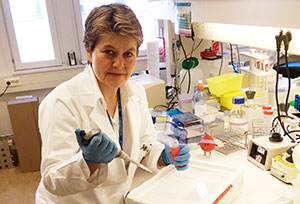Severe COVID-19 alters LDL, potentially increasing the future risk of cardiovascular disease

Researchers at Oslo University Hospital and at Wihuri Research Institute in Finland have identified persistent changes in LDL three months after hospitalization with severe COVID-19. Both the composition of the particle and inflammatory capacity have been altered and these alterations could contribute to an increased risk of developing heart disease later in life. The results have been published in the prestigious Journal of Infection.
Senior author is Bente Halvorsen from the Research Institute of Internal Medicine.
Patients who have been hospitalised with severe COVID-19 have permanent changes in their cholesterol 3 months after recovery. This could increase their risk of developing heart disease later in life.
Some individuals develop long-term symptoms after COVID-19, known as “long-COVID”. A broad spectrum of symptoms has been reported, but there is still a lot of unknown questions about the risk and underlying mechanisms of this condition. Several recent studies have shown that there is an association between COVID-19 and heart disease, however the mechanisms are still not known. In a recent paper, researchers at OUS, in collaboration with Wihuri Research institute in Finland, describe permanent changes in the LDL particles, commonly referred to as the “bad cholesterol” in patients who had been hospitalised with severe COVID-19. The changes persisted 3 months after recovery from Covid-19, suggesting long-lasting alterations in the particle composition, which could render the particles more harmful.
There is an established association of high LDL levels and the risk of cardiovascular disease. In addition, changes in the composition of the LDL particles is also associated with risk. The researchers investigated a specific characteristic of the LDL particles, so-called LDL aggregation, which is when the LDL particles group together in the blood vessels.
The researchers analysed blood samples from 66 people who had been hospitalised with severe COVID-19, taken during a check-up 3 months after being discharged from hospital. These patients were hospitalised during the first wave of COVID-19 in March 2020. The researchers compared these samples with 42 healthy adults who served as controls.
The COVID-19 patients had more inflammatory signal molecules attached to the surface of their LDL particle, and the aggregate size (size of LDL particles clogged together) were smaller. Such changes could influence the ability of these particle to migrate into the blood vessel wall; which could drive the development of heart disease in the long term.
The data suggest new mechanisms for increased cardiovascular risk in patients who have had COVID-19. However, further studies that can examine the connection between these LDL characteristics and the development of cardiovascular diseases, is needed.
Links:
Original paper:
Ueland T, Äikäs LAO, Dahl TB, Gregersen I, Olsen MB, Michelsen A, Schanke Y, Holopainen M, Ruhanen H, Singh S, NOR-SOLIDARITY Consortium, Tveita AA, Finbråten AK, Heggelund L, Trøseid M, Dyrhol-Riise AM, Nyman TA, Holven KB, Öörni K, Aukrust P, Halvorsen B (2023)
Low-density lipoprotein particles carrying proinflammatory proteins with altered aggregation pattern detected in COVID-19 patients 3 months after hospitalization
J Infect
DOI 10.1016/j.jinf.2023.02.024, PubMed 36822413
Media coverage:
From NRK - The Norwegian Broadcasting Corporation:
Norske forskere: Alvorlig korona kan øke risikoen for hjertesykdom – NRK Norge – Oversikt over nyheter fra ulike deler av landet
Dagsrevyen –March 12th – NRK TV (sections 7 and 8)
New article from the University of Oslo:
Severe COVID-19 can increase the risk of cardiovascular disease - Institute of Clinical Medicine (uio.no)
Partners
Immune regulation in atherosclerosis and other cardiometabolic diseases research group Oslo University Hospital:
OUH - Immune regulation in atherosclerosis and other cardio metabolic diseases (ous-research.no)
Research Insitute of Internal Medicine (ous-research.no)
Wihuri Research Institute www.wri.fi. Atherosclerosis research group in Finland: https://wri.fi/research-group/katariina-oorni-atherosclerosis-group/
University of Helsinki: https://www.helsinki.fi/en/faculty-biological-and-environmental-sciences/research/molecular-and-integrative-biosciences
